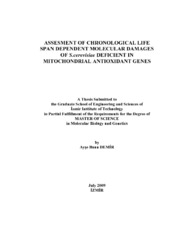Please use this identifier to cite or link to this item:
https://hdl.handle.net/11147/3648Full metadata record
| DC Field | Value | Language |
|---|---|---|
| dc.contributor.advisor | Koç, Ahmet | - |
| dc.contributor.author | Demir, Ayşe Banu | - |
| dc.date.accessioned | 2014-07-22T13:52:01Z | - |
| dc.date.available | 2014-07-22T13:52:01Z | - |
| dc.date.issued | 2009 | - |
| dc.identifier.uri | http://hdl.handle.net/11147/3648 | - |
| dc.description | Thesis (Master)--Izmir Institute of Technology, Molecular Biology and Genetics, Izmir, 2009 | en_US |
| dc.description | Includes bibliographical references (leaves: 38-40) | en_US |
| dc.description | Text in English; Abstract: Turkish and English | en_US |
| dc.description | x, 40 leaves | en_US |
| dc.description.abstract | Aging is referred as the time-dependent accumulation of biological and physiological changes in an organism. This complex process is the major factor that is associated with many diseases such as cancer, diabetes and neurodegenerative disorders.The free radical theory of aging, which states that the molecular damages formed upon free radicals lead to the aging process, is the most widely accepted aging theory. The free radicals that are primarily produced in the mitochondria upon aerobic metabolism, are known to damage the biomolecules such as DNA, proteins and lipids. However, cells have evolved different defense systems for the elimination of these molecular damages. Antioxidant defense mechanism is one these systems that play role in the repair of the molecular damages. Since mitochondria are the main sites for the free radical production, the antioxidant genes that function in mitochondria gained an importance for their roles in preventing the molecular damages in a cell. In this study, the differences in the life spans and levels of molecular damages among different mitochondrial antioxidant gene mutants of Saccharomyces cerevisiae were tried to be identified throughout the chronological aging process, which is the model that mimics post-mitotic cell aging in higher eukaryotes. It was shown that deletion of some mitochondrial antioxidant genes resulted in different levels of biomolecular damages as well as different sensitivities against reactive species, which may be a critical outcome for the prevention of the detrimental effects of free radicals on biomolecules formed during chronological aging. | en_US |
| dc.language.iso | en | en_US |
| dc.publisher | Izmir Institute of Technology | en_US |
| dc.rights | info:eu-repo/semantics/openAccess | en_US |
| dc.subject.lcc | QH470.S23 .D378 2009 | en |
| dc.subject.lcsh | Saccharomyces cerevisiae--Genetics | en |
| dc.subject.lcsh | Mitochondrial--DNA | en |
| dc.subject.lcsh | Antioxidants--Metabolism | en |
| dc.title | Assesment of Chronological Life Span Dependent Molecular Damages of S.cerevisiae Deficient in Mitochondrial Antioxidant Genes | en_US |
| dc.type | Master Thesis | en_US |
| dc.institutionauthor | Demir, Ayşe Banu | - |
| dc.department | Thesis (Master)--İzmir Institute of Technology, Molecular Biology and Genetics | en_US |
| dc.relation.publicationcategory | Tez | en_US |
| dc.identifier.wosquality | N/A | - |
| dc.identifier.scopusquality | N/A | - |
| item.openairetype | Master Thesis | - |
| item.cerifentitytype | Publications | - |
| item.grantfulltext | open | - |
| item.fulltext | With Fulltext | - |
| item.openairecristype | http://purl.org/coar/resource_type/c_18cf | - |
| item.languageiso639-1 | en | - |
| Appears in Collections: | Master Degree / Yüksek Lisans Tezleri | |
Files in This Item:
| File | Description | Size | Format | |
|---|---|---|---|---|
| T000823.pdf | MasterThesis | 1.75 MB | Adobe PDF |  View/Open |
CORE Recommender
Page view(s)
258
checked on Apr 7, 2025
Download(s)
52
checked on Apr 7, 2025
Google ScholarTM
Check
Items in GCRIS Repository are protected by copyright, with all rights reserved, unless otherwise indicated.